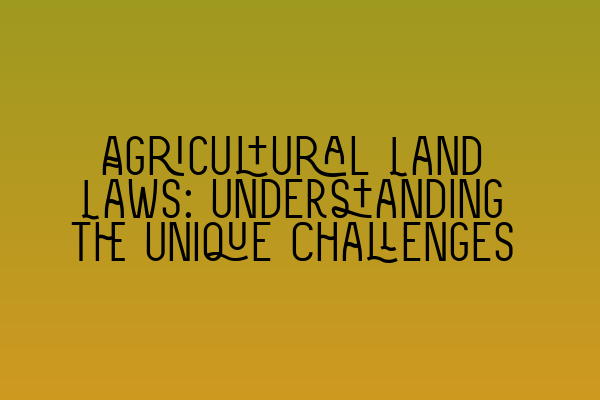Agricultural Land Laws: Understanding the Unique Challenges
When it comes to property law, agricultural land presents its own set of unique challenges. From statutory regulations to historical restrictions, navigating the legal landscape surrounding agricultural land can be complex and daunting. As a solicitor specializing in Property Law and Land Law at SQE, I understand the importance of staying informed about these intricacies and helping clients overcome the hurdles they may face in agricultural land transactions. In this blog post, we will explore some key aspects of agricultural land laws and shed light on the peculiar challenges they pose.
1. Planning Permissions and Rural Development:
Obtaining planning permissions for agricultural land can be a challenging process. The legal requirements surrounding the conversion of agricultural land for alternative uses often vary significantly from those pertaining to residential or commercial properties. These regulations aim to protect the countryside, preserve the agricultural character of the land, and promote sustainable rural development. It is crucial for property owners, developers, and investors to understand these regulations to ensure compliance and avoid any legal complications.
To delve deeper into the topic of planning permissions and rural development, you may find our related article on SQE 1 Practice Exam Questions helpful.
2. Environmental Considerations:
Agricultural land is not just about farming; it also provides vital ecosystems, wildlife habitats, and environmental benefits. As a result, environmental regulations play a significant role in managing agricultural land. Compliance with regulations concerning sustainable farming practices, water management, conservation, and environmental impact assessments is imperative. Understanding these environmental considerations and their legal implications is crucial for both landowners and those interested in acquiring agricultural land for development or investment purposes.
To gain further insights into environmental considerations in property transactions, you may visit our related article on SQE 1 Practice Mocks FLK1 FLK2.
3. Tenancy Agreements and Agricultural Holdings:
Agricultural land often comes with existing tenancy agreements and agricultural holdings, which can significantly impact the property’s value and potential uses. These agreements may offer the tenants rights and entitlements that must be respected and managed appropriately. As a solicitor, it is essential to thoroughly examine these agreements and advise clients accordingly, ensuring compliance with relevant legislation, such as the Agricultural Holdings Act 1986. Understanding the intricacies of these agreements is crucial for individuals seeking to invest in agricultural land or navigate tenancy-related disputes.
For a comprehensive understanding of tenancy agreements and agricultural holdings, our related article on SQE 2 Preparation Courses provides valuable insights.
4. Succession Planning and Inheritance:
Agricultural land is often passed down through generations within families, making succession planning and inheritance crucial considerations. The complex nature of agricultural property and the potential impact on farming operations require careful estate planning to manage matters such as inheritance tax, capital gains tax, and potential disputes. By seeking professional legal advice, landowners can ensure they have a clear succession plan in place, protecting their assets and facilitating a smooth transition between generations.
To explore the topic of succession planning and inheritance in agricultural property, our related article on SQE 1 Preparation Courses provides in-depth information you may find useful.
5. Common Agricultural Policy (CAP) and Brexit:
The Common Agricultural Policy (CAP) has played a significant role in shaping agricultural land law in the UK. However, with Brexit, the legislative landscape has undergone considerable changes. Understanding the impact of these changes on agricultural subsidies, land management schemes, and farming practices is crucial for those involved in the agricultural sector. Staying informed about the evolving regulations and their implications is imperative to effectively navigate the post-Brexit agricultural land market.
For the latest updates on agricultural land laws post-Brexit, our related article on SRA SQE Exam Dates provides valuable information.
In conclusion, agricultural land laws present unique challenges that require specialized knowledge and expertise to navigate successfully. Whether you are a landowner, developer, investor, or tenant, understanding the legal nuances surrounding agricultural land is crucial for making informed decisions and avoiding potential disputes. At SQE Property Law & Land Law, our team of solicitors is well-equipped to assist you in overcoming these challenges and ensuring your interests are protected. If you require legal advice or support regarding agricultural land, do not hesitate to contact us.
